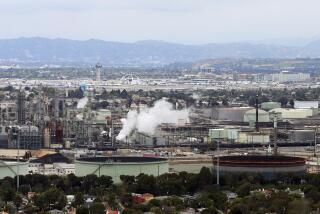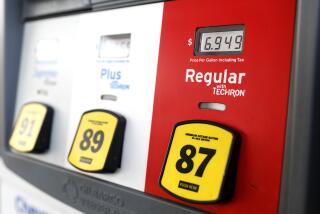State Senate leader proposes ‘carbon tax’ on motor vehicle fuels
SACARAMENTO — Californians, who already pay some of the highest gasoline prices in the nation, could soon be asked to pay more.
Pump prices are likely to climb more than 12 cents per gallon starting Jan. 1, both the oil industry and environmental experts agree. That’s when the state’s complex cap-and-trade system for pollution credits expands to cover vehicle fuels and their emissions.
As a result, gasoline producers would need to buy pollution credits, and they are expected to pass the cost along at the pump.
But state Senate leader Darrell Steinberg (D-Sacramento) has an alternative in mind: a carbon tax of 15 cents a gallon on fuels starting next year.
“Cap and trade is about to grow in a big way,” he said Thursday in a luncheon speech. The upshot, he warned, could include “spikes and wild fluctuations in gas prices.”
Steinberg thinks that he has a better plan to create a financial incentive for cars and trucks to spew less pollutants from their tailpipes.
He wants to junk the buying and selling of credits for vehicle fuel emissions and replace them with a straightforward “carbon tax.” The tax on gasoline, diesel and other fossil fuels would be more transparent and predictable, Steinberg said.
His proposed carbon tax would be collected at the distribution point and probably passed along to wholesalers, retailers and ultimately consumers, he said.
A carbon tax would add 15 cents to the price of a gallon of gas in 2015, Steinberg said, and go up after that.
That’s on top of the current state gasoline tax of 71.9 cents per gallon, the nation’s highest, and the federal gas tax of 18.4 cents per gallon, plus a state sales tax levied on the total retail sale.
His proposed carbon tax would rise to an estimated 24 cents per gallon in 2020, which would keep total gas prices lower than they would be under cap-and-trade projections, Steinberg said.
Steinberg, who will be termed out of the state Legislature at year’s end, said he realizes that the carbon tax could be a tough sell. Nevertheless, he said he’s eager to start a conversation on the best financial mechanism to help the state meet its goal of reducing carbon emissions to 1990 levels by the year 2020.
But changing the regulations drafted by the California Air Resources Board since the 2006 passage of the state’s landmark global warming law, AB 32, won’t be easy.
Conservative Republican and so-called moderate Democratic members of the Legislature could be hesitant to provide the two-thirds super-majority vote required to pass a tax increase.
On top of that, Democratic Gov. Jerry Brown, who led a successful ballot measure to raise income and sales taxes in 2012, has said he’s not interested in signing any tax hikes this year.
California’s anti-tax activists agree with the governor. “We don’t think that putting a big, new tax on gasoline is going to go over well with people spending a whole lot of money just to get to work,” said David Kline, a spokesman for the California Taxpayers Assn.
Environmentalists and businesses that are already participating in the cap-and-trade auction system for stationary pollution sources, such as factories and power plants, oppose any change.
Junking part of cap and trade would “tarnish California’s reputation as a national and global climate leader,” said Derek Walker of the Environmental Defense Fund.
Susan Frank, director of the California Business Alliance, which represents small to medium-sized clean-energy companies, called Steinberg’s proposal “a free pass” for the oil industry.
The president of a powerful oil trade group, the Western States Petroleum Assn., says her group has “no formal position” for now on the carbon tax proposal. But Catherine Reheis-Boyd said she’s excited that “there’s now a conversation” about which policy will deliver what Californians need in a way that has the least economic impact. Greenhouse gases generated by burning vehicle fuels account for about 40% of California’s total carbon emissions, she said.
Last year, the petroleum association shopped its own carbon tax proposal around the state Capitol, said legislative aides in both the Senate and Assembly, who were not authorized to speak to a reporter on the record.
Oil companies prefer a carbon tax to a cap-and-trade system because it’s more predictable and easier to pass the cost on to consumers, they said.
Under Steinberg’s plan, most of the proceeds from the tax, estimated at $3.6 billion in the first year, would be earmarked to help low- and moderate-income families, who suffer disproportionately from environment-related health problems.
The boost would be in the form of an earned income tax credit similar to a federal program to assist the poor. The rest would pay for transit and related environmental projects designed to give people an alternative to consuming oil, natural gas, propane and other hydrocarbons.
“Under either a carbon tax or cap and trade applied to fuel, consumers will pay more at the pump,” Steinberg acknowledged in his lunchtime speech to the Sacramento Press Club. “That’s necessary. Higher prices discourage demand. If carbon pricing doesn’t sting, we won’t change our habits.”
Twitter: @MarcLifsher







